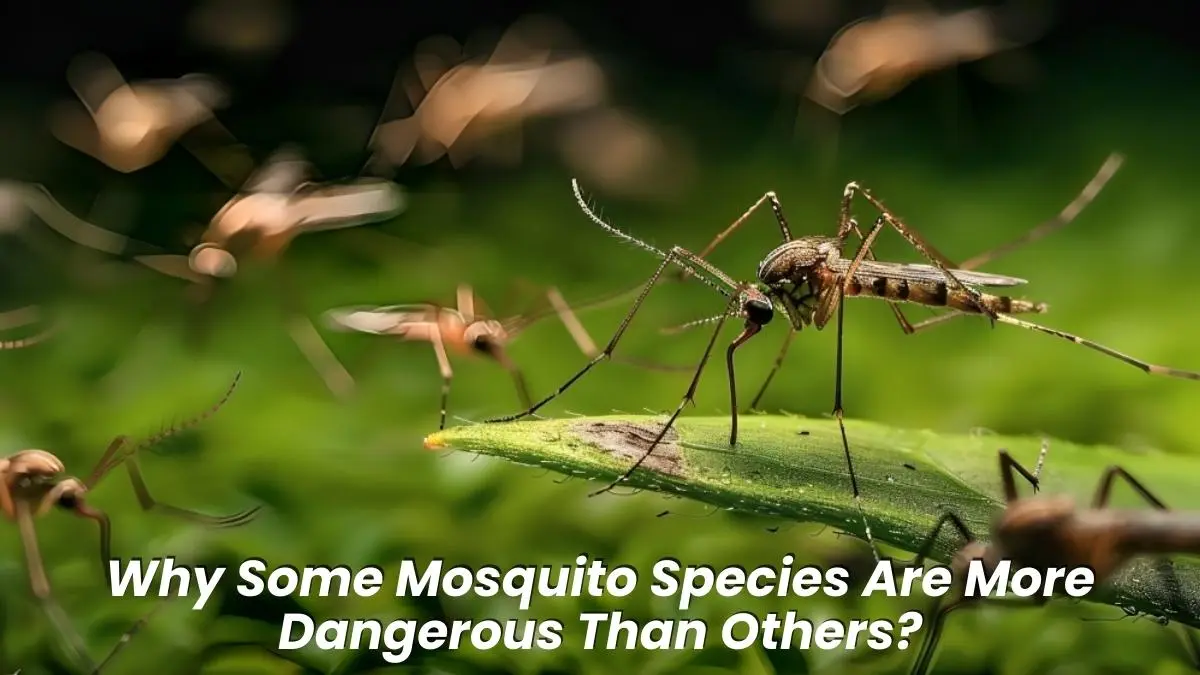GENERAL
Why Some Mosquito Species Are More Dangerous Than Others?

Mosquitoes might be small, but they pack a serious punch when it comes to global health. Not all mosquitoes are created equal, and some species are far more dangerous than others. Thus, it’s always best to hire professional mosquito control professionals for mosquito spraying in Virginia Beach to tackle serious infestations. But what makes certain mosquitoes a more significant threat? And how can you protect yourself from them? Let’s break it down.
Not All Mosquitoes Bite Humans
First things first—not every mosquito is out for your blood. With over 3,500 mosquito species worldwide, only a fraction actually bite humans. Many prefer feeding on birds, amphibians, or other mammals. The ones that do target humans, however, can be responsible for spreading serious diseases.
Three primary mosquito genera are known for their role in disease transmission:
- Aedes Mosquitoes – These mosquitoes are responsible for spreading viruses like Zika, dengue, and chikungunya. They are aggressive daytime biters and thrive in urban environments, making them a major health concern.
- Anopheles Mosquitoes – This group includes the infamous Anopheles gambiae, one of the most efficient malaria vectors in the world. These mosquitoes bite primarily at night and prefer warm, humid environments.
- Culex Mosquitoes – Known for transmitting West Nile virus, filariasis, and encephalitis, these mosquitoes are active from dusk until dawn and often breed in stagnant water.
Why Some Mosquitoes Are Deadlier
Certain mosquito species are more dangerous because of their ability to carry and transmit deadly pathogens. The key factors that make some mosquitoes worse than others include:
- Disease-Carrying Capacity – Some mosquitoes are more efficient at spreading viruses because of their biological makeup. For example, Aedes mosquitoes have a unique ability to harbor and spread multiple viruses without getting sick themselves.
- Feeding Behavior – Mosquitoes that prefer humans as their primary food source pose a greater threat. Aedes aegypti, for instance, is highly adapted to human environments and bites multiple times in one feeding cycle, increasing the chances of disease transmission.
- Breeding and Habitat – Some mosquitoes thrive in areas with standing water, urban settings, or tropical climates, which makes them more likely to interact with human populations. Anopheles mosquitoes, for example, are widespread in sub-Saharan Africa, where malaria is a major concern.
- Lifespan – The longer a mosquito lives, the more time it has to spread infections. Some species, like Anopheles mosquitoes, have longer lifespans, allowing them to pass on malaria to multiple hosts.
The Deadliest Mosquitoes in the World
Among the thousands of mosquito species, a few stand out as the worst offenders:
- Aedes aegypti – Responsible for dengue, Zika, and yellow fever, this mosquito thrives in tropical and subtropical regions.
- Aedes albopictus (Asian Tiger Mosquito) – Known for spreading dengue and chikungunya, this mosquito has a wide global distribution.
- Anopheles gambiae – One of the most efficient malaria vectors, particularly in Africa.
- Culex pipiens – A primary carrier of West Nile virus in North America and Europe.
How to Protect Yourself from Dangerous Mosquitoes?
Since some mosquitoes pose a higher risk than others, taking the right precautions is essential. Here’s what you can do to minimize your exposure:
- Eliminate Standing Water – Mosquitoes lay eggs in stagnant water, so empty containers, birdbaths, and clogged gutters regularly.
- Use Mosquito Repellents – DEET, picaridin, and oil of lemon eucalyptus are effective in keeping mosquitoes at bay.
- Install Screens and Nets – Protect your home by using window screens and sleeping under mosquito nets if you’re in a high-risk area.
- Wear Protective Clothing – Long sleeves, pants, and light-colored clothing can reduce the likelihood of bites.
- Use Mosquito Control Measures – Consider professional mosquito control near me treatments, introducing natural predators like fish in ponds, or using larvicides to disrupt mosquito breeding.
The Global Impact of Mosquito-Borne Diseases
According to the World Health Organization (WHO), mosquitoes are responsible for over 700,000 deaths annually due to diseases like malaria, dengue, and Zika. Malaria alone accounted for over 240 million cases worldwide in 2022, with most deaths occurring in children under five in Africa.
Climate change and urbanization are also making the problem worse. Rising temperatures and increased rainfall create ideal breeding conditions, allowing dangerous mosquito species to expand into new regions. In recent years, dengue outbreaks have been reported in areas previously unaffected by the virus, such as parts of the United States and Europe.
Final Thoughts
While all mosquitoes can be annoying, some are far more dangerous than others. Knowing which species pose the greatest threat and how to protect yourself can make all the difference. By reducing mosquito breeding sites, using repellents, and staying informed about local outbreaks, you can lower your risk of mosquito-borne illnesses.
For those living in high-risk areas, professional mosquito control services offer an added layer of protection. A single bite from the wrong mosquito can have serious consequences, so taking preventative measures is always worth it.
Did you learn something new from this article? If so, be sure to check out our blog for more educational content
-

 BIOGRAPHY9 months ago
BIOGRAPHY9 months agoBehind the Scenes with Sandra Orlow: An Exclusive Interview
-

 HOME1 year ago
HOME1 year agoDiscovering Insights: A Deep Dive into the //vital-mag.net blog
-

 HOME1 year ago
HOME1 year agoSifangds in Action: Real-Life Applications and Success Stories
-

 BIOGRAPHY1 year ago
BIOGRAPHY1 year agoThe Woman Behind the Comedian: Meet Andrew Santino Wife




























